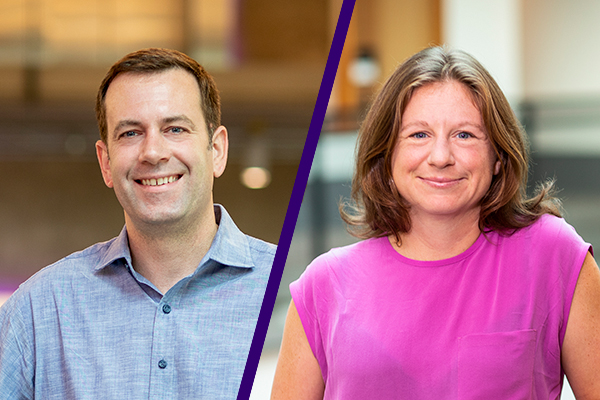The University of Washington is among the recipients of a five-year, $100 million investment announced today by the National Science Foundation (NSF) aimed at driving major advances in artificial intelligence research and education. The NSF AI Institute for Foundations of Machine Learning (IFML) — one of five new NSF AI Institutes around the country — will tap into the expertise of faculty in the Allen School’s Machine Learning group and the UW Department of Statistics in collaboration with the University of Texas at Austin, Wichita State University, Microsoft Research, and multiple industry and government partners. The new institute, which will be led by UT Austin, will address a set of fundamental problems in machine learning research to overcome current limitations of the field for the benefit of science and society.
“This institute tackles the foundational challenges that need to be solved to keep AI on its current trajectory and maximize its impact on science and technology,” said Allen School professor and lead co-principal investigator Sewoong Oh in a UW News release. “We plan to develop a toolkit of advanced algorithms for deep learning, create new methods for coping with the dynamic and noisy nature of training datasets, learn how to exploit structure in real-world data, and target more complex and real-world objectives. These four goals will help solve research challenges in multiple areas, including medical imaging and robot navigation.”
Oh is part of a group led by UW colleague Sham Kakade that will collaborate on the development of a toolkit of fast and efficient algorithms for training neural networks with provable guarantees. The group also aims to eliminate human bottlenecks associated with training machine learning models by constructing a new theoretical and algorithmic framework for neural architecture optimization (NAO). The latter has received minimal attention from researchers despite a broad range of potential applications, including the deployment of energy-efficient networks for edge computing and the Internet of Things, more transparent interpretable models to replace so-called blackbox predictions, and automated, user-friendly systems that enable developers to apply deep learning to real-world problems.
“The lack of science around NAO is a structural deficit within machine learning that makes us reliant on human intervention for hyper-parameter tuning, which is neither scalable nor efficient,” explained Kakade, who holds a joint appointment in the Allen School and the Department of Statistics. “Using techniques from mathematical optimization and optimal transport, we will automate the process to speed up the training pipeline while significantly reducing its carbon footprint to meet the growing need for academic and commercial applications. Our work will also provide a rigorous theoretical foundation for driving future advances in the field.”
In addition to making progress on NAO and other core machine learning problems, IFML researchers are keen to demonstrate how the results of their work can have real-world impact. To that end, they will apply the new tools and techniques they have developed to multiple use cases where machine learning holds the potential to advance the state of the art, including video compression and recognition, imaging tools for medical applications and circuit design, and robot navigation. The latter effort, which will be spearheaded by Allen School professor Byron Boots, seeks to overcome current limitations on the ability of robots to operate in unstructured environments under dynamic conditions while simultaneously reducing the training burden.
“Room layouts vary, objects can be moved, and humans are generally unpredictable. These conditions pose a challenge to the safe and reliable operation of robots alongside the many users, co-workers, and random passers-by who may share the same space,” noted Boots. “We need to broaden our concept of what constitutes a robot perception task, from one of pure recognition to one where the robot is capable of viewing the environment in the context of goals shaped by interaction and intention. I’m looking forward to working with this team to translate our foundational research into practical solutions for supporting this new paradigm.”
On the human side, a major goal of the IFML is the broadening of participation in AI education and careers to meet expanding workforce needs and to ensure that the field reflects the diversity of society. Institute members will focus their education and workforce development efforts along the entire pipeline, from K-12 to graduate education. Their plans include development of course content for high school students who currently lack access to AI curriculum, the launch of a new initiative aimed at engaging more undergraduate students in AI research, and the build-out of a multi-state, online Master’s program that will leverage faculty from all three member institutions. Allen School professor Jamie Morgenstern, whose research focuses on the social impacts of machine learning, will lead the charge to implement Project 40×24, which aims to increase the number of women participating in AI to represent at least 40% of the field by the year 2024.
“Given the skyrocketing demand for expertise in AI across academia and industry, it should be a national priority to give students and working professionals access to high-quality educational opportunities in this field,” Morgenstern said. “We need to prepare more people from diverse backgrounds to actively participate in shaping the technologies that will have a growing impact on everyone’s lives. And we have a responsibility to ensure that new knowledge and economic opportunities generated by innovations in machine learning are broadly accessible to all.”
Zaid Harchaoui, a professor in the Department of Statistics and an adjunct faculty member in the Allen School, rounds out the UW team.
The IFML is one of two NSF AI Institutes announced today with UW involvement. The other is the NSF AI Institute for Research on Trustworthy AI in Weather, Climate, and Coastal Oceanography led by the University of Oklahoma in collaboration with UW’s Evans School of Public Policy & Governance and other academic and industry partners.
Each of the five inaugural NSF AI Institutes will receive $20 million over five years. NSF has cast today’s announcement as the start of a longer term commitment, as the agency anticipates making additional institute announcements in future. The initiative, which represents the United States’ most significant federal investment in AI research and education to date, is a partnership between NSF and the U.S. Department of Agriculture, U.S. Department of Homeland Security, and U.S. Department of Transportation.
Read the NSF announcement here, the UW News release here, and UT Austin’s IFML press release here. Learn more about the NSF AI Institutes here.





